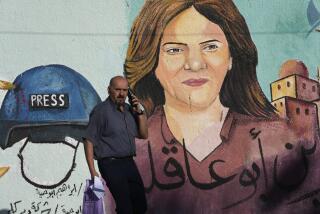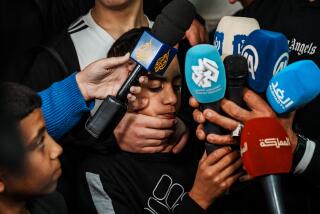U.S holds journalist without charges in Iraq
- Share via
BAGHDAD — The soldiers came at 1:30 a.m, rousing family members who were sleeping on the roof to escape the late-summer heat.
They broke down the front door. Accompanied by dogs, American and Iraqi troops burst into the Jassam family home in the town of Mahmoudiya south of Baghdad.
“Where is the journalist Ibrahim?” one of the Iraqi soldiers barked at the grandparents, children and grandchildren as they staggered blearily down the stairs.
Ibrahim Jassam, a cameraman and photographer for the Reuters news agency, stepped forward, one of this brothers recalled. “Take me if you want me, but please leave my brothers.” The soldiers rifled through the house, confiscating his computer hard drive and cameras. And then they led him away, handcuffed and blindfolded.
That was Sept. 2.
Jassam, 31, has been in U.S. custody ever since. His case is the latest of a dozen detentions the New York-based Committee to Protect Journalists has documented since 2001.
No formal accusations have been made against Jassam, and an Iraqi court ordered in November that he be released for lack of evidence. But the U.S. military continues to hold him, saying it has intelligence that he is “a high security threat,” said Maj. Neal Fisher, spokesman for detainee affairs.
The Obama administration harshly criticized Iran for its imprisonment of Roxana Saberi, the U.S.-Iranian journalist who was convicted of espionage and sentenced to eight years in prison before being freed two weeks ago. Secretary of State Hillary Rodham Clinton criticized Iran’s treatment of Saberi as “non-transparent, unpredictable and arbitrary.”
Washington also has called upon North Korea to expedite the trial of two U.S. journalists being held on spying charges.
Yet the U.S. has routinely used the arbitrary powers it assumed after the Sept. 11, 2001, terrorism attacks to hold journalists without charge in Iraq, as well as Afghanistan and Pakistan, the Committee to Protect Journalists said.
None of the detained journalists has been convicted of any charge, undermining the United States’ reputation when it comes to criticizing other countries on issues of press freedom, committee executive director Joel Simon said.
“The U.S. has a record of holding journalists for long periods of time without due process and without explanation,” he said. “Its standing would be improved if it addressed this issue.”
Reuters has expressed disappointment over Jassam’s detention and has said there is no evidence against him.
Sami Haj, a cameraman for the TV network Al Jazeera, was detained by Pakistani authorities as he tried to cross into Afghanistan in 2001 to cover the offensive against the Taliban. He was turned over to the U.S. military, which held him for six years at the detention facility in Guantanamo Bay, Cuba. He was accused him of being a courier for militant Islamic organizations, but was never charged. He was released a year ago.
In Iraq, Associated Press photographer Bilal Hussein was held for two years without trial before being released in April 2008 on the orders of an Iraqi judge under the terms of an amnesty law. The U.S. military maintained that Hussein had links to insurgents, but the AP said the allegations were based on nothing more than the Pulitzer Prize-winning photographs of insurgents that he had taken on the streets of Ramadi, in western Iraq.
Jassam is the only Iraqi journalist still in U.S. custody, the last to be detained under wartime rules that predated a U.S.-Iraqi security agreement signed in December. Under the new accord, U.S. forces must obtain a warrant before they can arrest an Iraqi citizen.
Jassam was detained without a warrant “as the result of his activity with a known insurgent organization,” Fisher said.
No evidence against Jassam was presented at his court hearing in November, Fisher said, because the military intelligence against him had not yet been verified.
Under the wartime rules in place at the time, he said, “there was no requirement to link the military intelligence with rule of law type of evidentiary procedures.”
After the court ordered Jassam’s release, Fisher said, new evidence came to light that suggested he was a “high security threat.”
The CPJ’s Simon said it was possible for someone to use the cover of journalism to conduct other activities.
“No one is suggesting that journalists should have a get- out-of-jail-free card,” he said. “But if you accuse someone of something there needs to be a fair legal process. That’s what we said in the Roxana Saberi case, and that’s what we say in the Ibrahim Jassam case.”
Jassam will have to wait for the requirements of the security pact to play out before he gets another day in court or his freedom. The agreement states that the U.S. is to release low-threat detainees in a “safe and orderly” way and refer “high threat” cases to the Iraqi Justice Ministry for review.
The decision to release him or transfer him to the Iraqi legal system will be made by the Iraqi government. The only timetable for that step is “by the end of the year,” Fisher said. By that time, Jassam will have been in custody for more than a year.
Jassam’s brother, Walid, visited him recently in Camp Bucca, the desolate, tented U.S. prison camp in the desert in southern Iraq, and found him close to the breaking point.
“He used to be handsome, but now he’s pale and he’s tired,” said Walid, who says his brother had no ties to insurgents. “Every now and then while we were talking, he would start crying. He was begging me: ‘Please do something to get me out of here. I don’t know what is the charge against me.’
“I told him we already tried everything.”
--
Times Staff Writer Saif Hameed contributed to this report.
More to Read
Sign up for Essential California
The most important California stories and recommendations in your inbox every morning.
You may occasionally receive promotional content from the Los Angeles Times.










